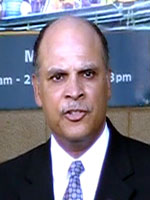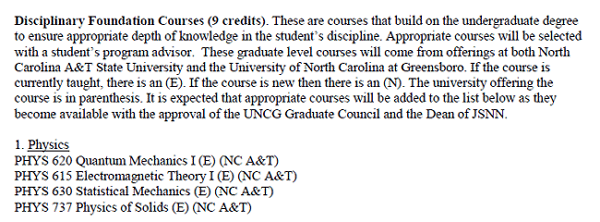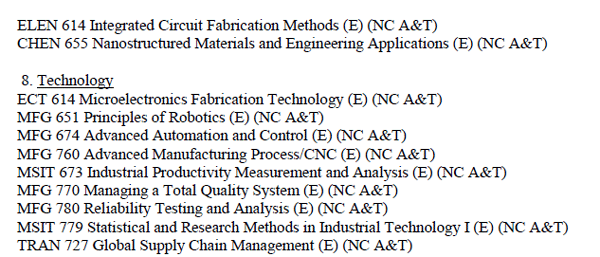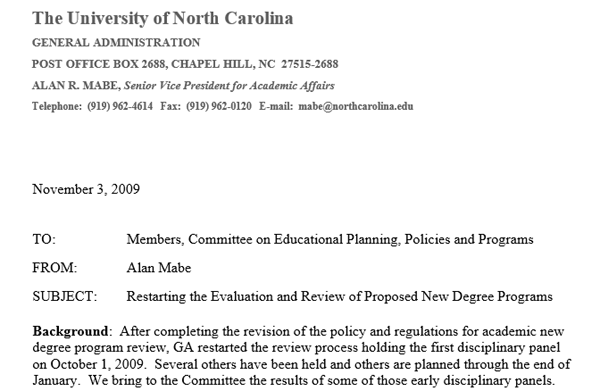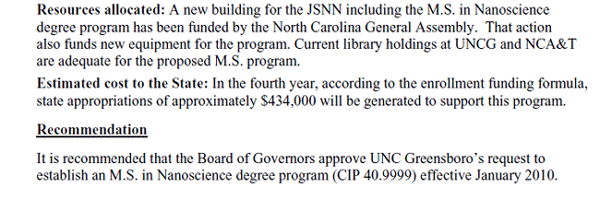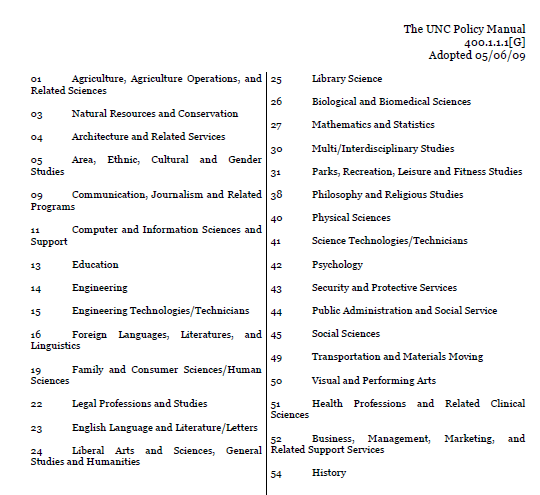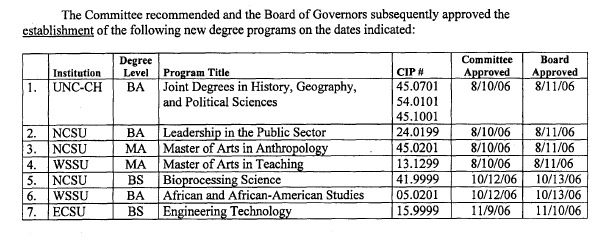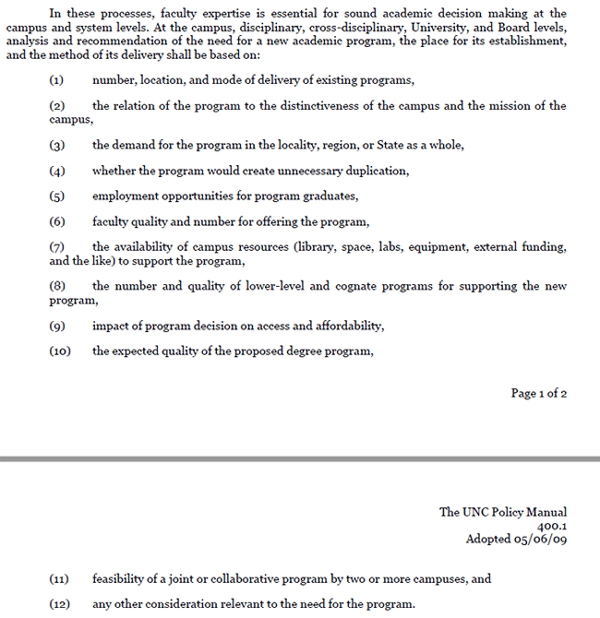 Banality
of Evil -- UNC Board of Governors' UNC Greensboro
Joint
School of Nanoscience and Nanoengineering located on bogus
NCA&T/UNCG Joint Millennial Campus - UNCG affilate Gateway University Research
Park, -Greensboro, NC; Conceived in bigotry and nourished on
the twin fronts of prejudice and injustice,
You Don't take a Mule to the Kentucky Derby:
UNC Board of Governors Bogus UNC Greensboro
white privilege Nanoscience MS and PhD degrees Banality
of Evil -- UNC Board of Governors' UNC Greensboro
Joint
School of Nanoscience and Nanoengineering located on bogus
NCA&T/UNCG Joint Millennial Campus - UNCG affilate Gateway University Research
Park, -Greensboro, NC; Conceived in bigotry and nourished on
the twin fronts of prejudice and injustice,
You Don't take a Mule to the Kentucky Derby:
UNC Board of Governors Bogus UNC Greensboro
white privilege Nanoscience MS and PhD degrees |
| |
 |
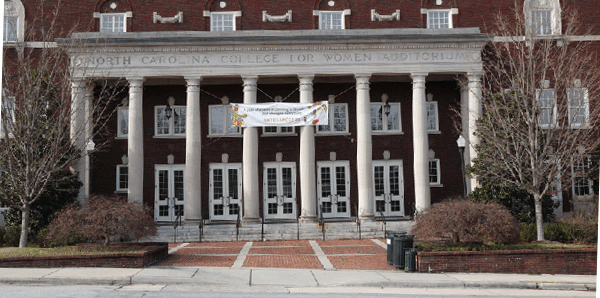 |
| |
|
|
North Carolina, like other Southern states, relied on slavery to
build its economy during the 18th and 19th centuries. Slaves across
the state raised crops, did domestic chores, constructed new
buildings, sailed ships, and performed countless other jobs, all for
no pay." The Story of Slavery in North Carolina |
| |
|
“The Joint School for Nanoscience and Nanoengineering…..
built on the major
nano-technology research activity that had been
established at nearby Wake Forest and at NCA&T” #1 |
| |
|
“It [JSNN] will be one of the most stimulating
opportunities in the history of the area and will
serve as a national model for collaboration between
two institutions, one a historical black institution
and the other a historical white female
institution.”
“The building would include the academic
departments, laboratory facilities (teaching and
research), and centers and institutes of the new
School as well as selected centers and institutes
currently located at the partner
universities. Emphasis added
"
In addition to degree programs in nanoscience and
nanoengineering,
JSNN will engage in research and outreach, as well
as the expected roles of a land-grant institution,
such as teaching agriculture and engineering, and
providing cooperative extension services.
|
|
 |
| |
For
Liberal Arts UNC Greensboro with programs in music
and nursing to offer Nanoscience degrees requires
access to NCA&T academic programs and research:
“Although the degree is in Nanoscience (does not
include Nanoengineering),

students will be given the opportunity to take
relevant courses at the
School of Engineering at North Carolina A&T
University and will be able to work on collaborative
projects with faculty in the School of Engineering”.
[Request
to Plan Joint NCA&T/UNCG Joint Nanoscience Ph.D.] |
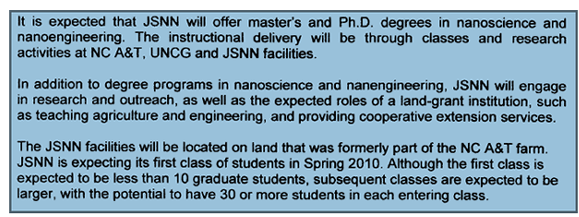 |
|
The JSNN facilities will be located on land that was
formerly part of the NC A&T farm." Their Plan. |
|
|
| |
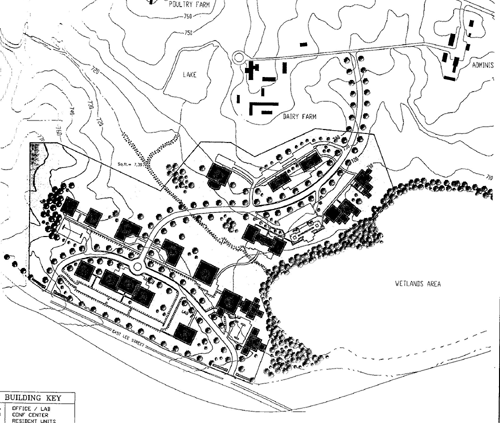 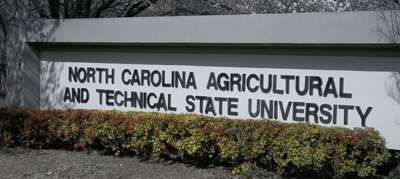 HBCU
institution North Carolina A&T, one
of the state's two land grant institutions, has programs through the
doctoral level. Its programs include engineering, arts and sciences,
agricultural and environmental sciences, business and economics,
education, nursing, technology, and graduates studies.
“
The expected roles of a land-grant
institution, is teaching
agriculture and engineering, and providing cooperative extension
services”. NC A&T's 2001
amend University Master Plan called for developing 75 acres of land
along East Lee Street targeted to develop new opportunities for both
research and education in both the private and academic arenas
between the University's technology and agricultural research and
its students, which didn't include across-town historical white UNC
Greensboro and its members of the Greensboro business community. HBCU
institution North Carolina A&T, one
of the state's two land grant institutions, has programs through the
doctoral level. Its programs include engineering, arts and sciences,
agricultural and environmental sciences, business and economics,
education, nursing, technology, and graduates studies.
“
The expected roles of a land-grant
institution, is teaching
agriculture and engineering, and providing cooperative extension
services”. NC A&T's 2001
amend University Master Plan called for developing 75 acres of land
along East Lee Street targeted to develop new opportunities for both
research and education in both the private and academic arenas
between the University's technology and agricultural research and
its students, which didn't include across-town historical white UNC
Greensboro and its members of the Greensboro business community. |
| |
 In
2003-04, with the backbone of North
Carolina's industrial economy Tobacco,
Textiles, and Furniture outsourced, in
decline/recession or outsourced with
appropriations for UNC-System taking an
ever increasing multi-billion dollar
bite out of state's coffers, North
Carolina's Legislature thru House Bill
1264 (HB 1264) direct UNC-BOG and
COMMUNITY COLLEGE SYSTEM to contract a
private consulting firm that had
experience in higher education to
conduct a comprehensive study
(Staying a step ahead) of the
mission and educational program needs to
ensure that the State's citizens are
academically prepared and equipped for
current job opportunities and jobs of
the future in North Carolina's growing
knowledge economy. In
2003-04, with the backbone of North
Carolina's industrial economy Tobacco,
Textiles, and Furniture outsourced, in
decline/recession or outsourced with
appropriations for UNC-System taking an
ever increasing multi-billion dollar
bite out of state's coffers, North
Carolina's Legislature thru House Bill
1264 (HB 1264) direct UNC-BOG and
COMMUNITY COLLEGE SYSTEM to contract a
private consulting firm that had
experience in higher education to
conduct a comprehensive study
(Staying a step ahead) of the
mission and educational program needs to
ensure that the State's citizens are
academically prepared and equipped for
current job opportunities and jobs of
the future in North Carolina's growing
knowledge economy. |
|
| |
|
 |
Emerging from a legislative mandated study HB
1264
,Staying a Step
Ahead, to ensure the State's citizens are
academically prepared and equipped for current
job opportunities and jobs of the future in
North Carolina's growing knowledge economy,
explicitly referred to research clusters
created by HBCU NCA&T |
|
| |
| "It is predicted that nano scale
science will change the nature of almost every
human-made product this century. This field has great
potential applications in materials, medicine,
electronics, optics, data storage, advanced
manufacturing, environment, energy, and national
security. Some specific applications include:
lightweight new materials with greatly improved strength
and wear characteristics; ultra-dense computer memory;
better drug design and better drug and gene delivery;
sensing applications for agricultural, biological,
chemical and homeland security applications; improved
catalysts for the chemical and automotive industries;
new materials to improve fuel economy and carbon dioxide
emissions; and improved batteries and energy efficient
processes for energy technologies. Nanoscale materials
already find use in numerous pharmaceutical, catalytic,
electronic, magnetic, optoelectronic, biomedical,
cosmetic and energy applications." [PCG/UNC-NCCS/UNC
Interim report3. doc/RB.SP.PC.CR.Atpcc.I /CC.14/10May05
page 109] |
| |
| NCA&T is "well
known in areas such as advanced materials, nanotechnology,
computational science, and says N. Radhakrishnan, former for
research and economic development at N.C. A&T. The school
also has significant strengths in other areas, including
biotechnology, energy and the environment, |
|
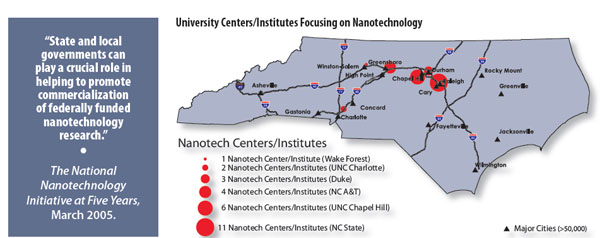 |
 Historical
Black Land Grant NCA&T was listed as University
focus on Nanotechnology in
2005.
Cross-town Historical White UNC Greensboro was not
listed as a University focused on Nanotechnology. Historical
Black Land Grant NCA&T was listed as University
focus on Nanotechnology in
2005.
Cross-town Historical White UNC Greensboro was not
listed as a University focused on Nanotechnology.
|
| |
|
| information
sciences and technology, logistics and transportation
development. All these
endeavors are aligned in eight research clusters that bring
faculty together across disciplines to develop large
research projects. These research clusters run in parallel
with a number of multidisciplinary centers and institutes at
N.C. A&T, which develop partnerships with private and
corporate sponsors, educational institutions, and government
agencies. |
| |
|
Nanotechnology is
Experimental
NCA&T State
University has been funded at an
average rate of $3-5 million per
year in the area of nanoscience
and nanotechnology. Most of the
research in nanoengineering is
done in the Center for
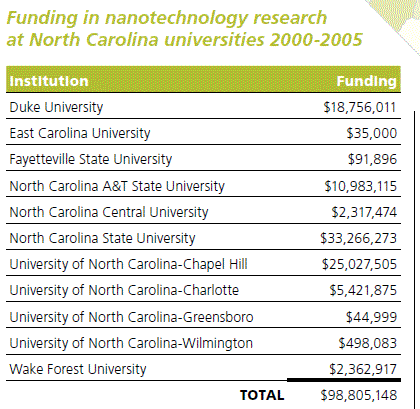 Advanced
Materials and Smart Structures (CAMSS).
Several Centers and projects are
under CAMSS, including the NSF
Center for Research Excellence
in Science and Technology
(CREST), the DoD Center for
Nanoscience, Nanomaterials and
Multifunctional Materials (CNN)
for Homeland Security, the NSF
Nanoscale Science and
Engineering Center (NSEC), the
NSF project on US/Europe
Materials Collaboration:
Self-Organized Nanostructured
Thin Films for Catalysis, the
NSF project on Nanoscale
Interdisciplinary Research Teams
(NIRT), the NSF Major Research
Instrumentation for
Nanoengineering Research, and
the NSF Nanotechnology
Undergraduate Education (NUE)
program. CAMSS also facilitates
many of the materials research
activities of the NASA-National
Institute for Aerospace (NIA).
In addition, the Center for
Composite Materials Research (CCMR)
does research in nano-enhanced
composite materials and the Army
Center of Excellence for
Battlefield Capability
Enhancements (Flexible Displays)
does research in material
characterization and development
of novel displays. Advanced
Materials and Smart Structures (CAMSS).
Several Centers and projects are
under CAMSS, including the NSF
Center for Research Excellence
in Science and Technology
(CREST), the DoD Center for
Nanoscience, Nanomaterials and
Multifunctional Materials (CNN)
for Homeland Security, the NSF
Nanoscale Science and
Engineering Center (NSEC), the
NSF project on US/Europe
Materials Collaboration:
Self-Organized Nanostructured
Thin Films for Catalysis, the
NSF project on Nanoscale
Interdisciplinary Research Teams
(NIRT), the NSF Major Research
Instrumentation for
Nanoengineering Research, and
the NSF Nanotechnology
Undergraduate Education (NUE)
program. CAMSS also facilitates
many of the materials research
activities of the NASA-National
Institute for Aerospace (NIA).
In addition, the Center for
Composite Materials Research (CCMR)
does research in nano-enhanced
composite materials and the Army
Center of Excellence for
Battlefield Capability
Enhancements (Flexible Displays)
does research in material
characterization and development
of novel displays.
NCA&T was 4th in Nanotechnology
Research at North Carolina
Universities with $11 Million
Dollars between 2000-2005. UNC
at Greensboro 10th among the 11
institutions conducted $45,000
dollars of Nanotechnology
research between 2000 thru 2005.
In 2003 A&T, NATO Sponsor
Material Symposium in Ukraine |
|
|
|
| |
| Staying a Step Ahead (HB 1264(7)(2003-04))
the Legislature mandated the Board of Governors
emphasized existing and new programs at Liberal Arts
Universities specifically aimed at meeting business,
industry, workforce, and career needs of North Carolina
in the State's changing and growing knowledge-based
economy, taking into account, as appropriate, State and
regional economic strategies. |
| |
With the source of enrollment growth being
minorities as white enrollment leveled off across the
University of North Carolina,
 Guilford
Technical Community College experiencing record
enrollment, ECPI University and ITT Tech offering
addition technology based education in the Triad
education market place. What’s left on the plate for
cross-town Majority serving Liberal Arts UNC Greensboro
with a potential national and regional prominent HBCU
NCA&T across town? Would political astute business
organization affiliated UNC-G use political connections
to reposition Majority serving UNC-G in and Minority
serving NCA&T out? UNC-G 2003-08 formulated a 2003-08
academic plan to establish a joint Millennial campus
with NC A&T. Guilford
Technical Community College experiencing record
enrollment, ECPI University and ITT Tech offering
addition technology based education in the Triad
education market place. What’s left on the plate for
cross-town Majority serving Liberal Arts UNC Greensboro
with a potential national and regional prominent HBCU
NCA&T across town? Would political astute business
organization affiliated UNC-G use political connections
to reposition Majority serving UNC-G in and Minority
serving NCA&T out? UNC-G 2003-08 formulated a 2003-08
academic plan to establish a joint Millennial campus
with NC A&T. |
|
| |
|
 |
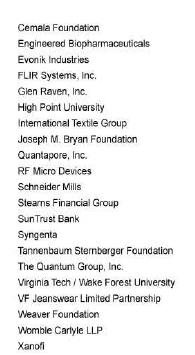 |
Rewinding
to 1991-92,
at bequest of UNC Board of
Governors NC Legislature enacted
NC GA § 116‑252.
Piedmont Triad Graduate
Engineering Program in support
faculty and graduate students
 involved
in engineering at the campuses
of The University of North
Carolina. In doing so UNC Board
of Governors rejected a $20
Million
dollar NCA&T/UNC-G
Engineering and Science Research
Center; "but that center
[Piedmont Triad Engineering
Research Center] contains no
role for
UNCG, which
had
hoped to get
several doctoral level programs
out of a joint engineering and
science research center with
A&T"; involved
in engineering at the campuses
of The University of North
Carolina. In doing so UNC Board
of Governors rejected a $20
Million
dollar NCA&T/UNC-G
Engineering and Science Research
Center; "but that center
[Piedmont Triad Engineering
Research Center] contains no
role for
UNCG, which
had
hoped to get
several doctoral level programs
out of a joint engineering and
science research center with
A&T";
|
|
"UNCG/A&T
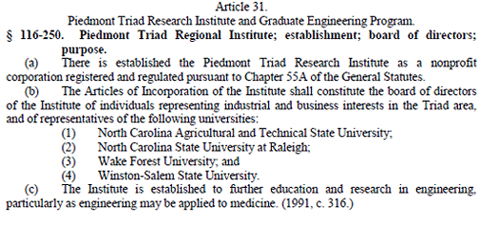 proposal
had won the enthusiastic endorsement of
top Greensboro business leaders.
Acting through the Greensboro
Development Corp., they last year
commissioned a $300,000 study to
determine what areas of research at
UNCG/A&T center could engage in to
the benefit of the Triad economy and
its industries"; and I'm [banker
E.S. ``Jim'' Melvin, chairman of the
Greensboro Development Corp convinced
it [Research Center] is the thing to
do, but we've got to work through the
university system, build the case for it
and get it high on the
board's priority
list. That's going to take some time.''
reported Jack Scism
TRIAD
SCIENTIFIC RESEARCH CENTER: VIABLE DREAM
OR PIE IN THE SKY? , JACK SCISM,
Greensboro News & Record - Monday, July
20, 1992 . (emphasis added) proposal
had won the enthusiastic endorsement of
top Greensboro business leaders.
Acting through the Greensboro
Development Corp., they last year
commissioned a $300,000 study to
determine what areas of research at
UNCG/A&T center could engage in to
the benefit of the Triad economy and
its industries"; and I'm [banker
E.S. ``Jim'' Melvin, chairman of the
Greensboro Development Corp convinced
it [Research Center] is the thing to
do, but we've got to work through the
university system, build the case for it
and get it high on the
board's priority
list. That's going to take some time.''
reported Jack Scism
TRIAD
SCIENTIFIC RESEARCH CENTER: VIABLE DREAM
OR PIE IN THE SKY? , JACK SCISM,
Greensboro News & Record - Monday, July
20, 1992 . (emphasis added) |
| |
Reported in the Media: " Its
[UNCG] historically strong programs
in music, education and nursing are
not the kinds of programs that spin
off research and development or
software companies to fuel high tech
economies". ...
"Last
year, the development corporation
proposed the idea of developing a
UNCG/A&T Knowledge and Industry
Campus, perhaps in southeast
Greensboro...This would be the
beginning of our version of N.C.
State's Centennial Campus."
[Ken Mayer,
Editorial, UNCG, A&T University will
need to be leaders in the charge for
high-tech industry in the Triad,
Triad Business Journal Nov 9, 1998]
( Ken Mayer is former Chairman UNCG
BOT 2003-2004 & 2004-2005.
|
| |
Reported in the Media: UNC-Greensboro Board of
Trustees Nov. 2, 2006, approved budget request part of
a 19-page proposal outlining plans for the nanotech
program scheduled to go before trustees at A&T Nov.
15. The school, as it is proposed, would offer a
 doctorate in Nanoscience and Nanoengineering and a
professional science master's program. Officials
from both A&T and UNC-G doctorate in Nanoscience and Nanoengineering and a
professional science master's program. Officials
from both A&T and UNC-G
declined
to comment on the proposal because it had not yet been
presented to the A&T trustees. It must be approved by
both schools before it can be submitted to the UNC
General Administration for evaluation. “ [
Big
money, small science: UNC-G, A&T to seek $65M for
nanotech school] Emphasis added |
| |
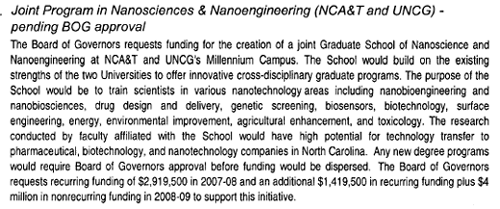 Notwithstanding
Pursuant to applicable provisions of state law and policies of the
Board of Governors, the boards of trustees of affected constituent
institutions shall have authority and responsibility for the
adoption of policies applicable to and the control and supervision
of campus facilities [G.S.116-35], Appendix 1 - DELEGATIONS OF DUTY
AND AUTHORITY TO BOARDS OF TRUSTEES, The UNC Policy Manual ,Chapter
100.1 - The Code, XVI. AUXILIARY ENTERPRISES, UTILITIES AND
MISCELLANEOUS FACILITIES. Notwithstanding
Pursuant to applicable provisions of state law and policies of the
Board of Governors, the boards of trustees of affected constituent
institutions shall have authority and responsibility for the
adoption of policies applicable to and the control and supervision
of campus facilities [G.S.116-35], Appendix 1 - DELEGATIONS OF DUTY
AND AUTHORITY TO BOARDS OF TRUSTEES, The UNC Policy Manual ,Chapter
100.1 - The Code, XVI. AUXILIARY ENTERPRISES, UTILITIES AND
MISCELLANEOUS FACILITIES.
Prior to NC A&T Board
of Trustees Meeting Nov. 15, 2006 Subject of a policy
discussion UNC Board of Governors 2007-2009 Budget Priorities
November 10, 2006 called for Pending Board of Governors approval,
funding for the creation of a joint Graduate School of Nanoscience
and Nanoengineering at NCA&T and UNC-G's Millennium Campus. |
| |
 UNC
BOG Committee on Budget and
Finance, April 2006,
approved recommending 1.3
million dollars for planning a
Biotechnology Building at NCA&T
to full BOG. Proposed facility
would enable NCA&T to support
ongoing and expanding research
activities in bioengineering,
biotechnology, and biomedicine.
NC
A&T' biotechnology program is
interdisciplinary and will
incorporate research activities
currently housed in the
College of Engineering,
College of Arts and Sciences,
and
School of Agriculture and
Environment Sciences.
The Total cost of this project
is $25 Million dollars. UNC
BOG Committee on Budget and
Finance, April 2006,
approved recommending 1.3
million dollars for planning a
Biotechnology Building at NCA&T
to full BOG. Proposed facility
would enable NCA&T to support
ongoing and expanding research
activities in bioengineering,
biotechnology, and biomedicine.
NC
A&T' biotechnology program is
interdisciplinary and will
incorporate research activities
currently housed in the
College of Engineering,
College of Arts and Sciences,
and
School of Agriculture and
Environment Sciences.
The Total cost of this project
is $25 Million dollars. |
| |
 UNC
Board of Governors
2007-09 budget
Priorities bogus claim
the Greensboro Center
for Innovative
Development- renamed
Gateway University
Research Park- as NCAT/UNC-G
Joint Millennial Campus
relocated NCA&T
College of Engineering,
School of Technology,
Physical Sciences and
Applied Sciences
programs and research,
off –campus
to the bogus Joint
Millennial (with UNCG)
doubling the cost
$25
million vs. $50 million. UNC
Board of Governors
2007-09 budget
Priorities bogus claim
the Greensboro Center
for Innovative
Development- renamed
Gateway University
Research Park- as NCAT/UNC-G
Joint Millennial Campus
relocated NCA&T
College of Engineering,
School of Technology,
Physical Sciences and
Applied Sciences
programs and research,
off –campus
to the bogus Joint
Millennial (with UNCG)
doubling the cost
$25
million vs. $50 million. |
|
|
| |
 At
the request of President Bowles,
Chancellor Hackley served as Chancellor
at North Carolina A&T State University
from June 2006 – June 2007, while the
University conducted a search after the
resignation of the former chancellor at
North Carolina A&T State University.
Bowles appointee Interim NC A&T
Chancellor Lloyd V. Hackley and UNCG
Chancellor made the Request to Establish
The JSNN March 7, 2007. At
the request of President Bowles,
Chancellor Hackley served as Chancellor
at North Carolina A&T State University
from June 2006 – June 2007, while the
University conducted a search after the
resignation of the former chancellor at
North Carolina A&T State University.
Bowles appointee Interim NC A&T
Chancellor Lloyd V. Hackley and UNCG
Chancellor made the Request to Establish
The JSNN March 7, 2007. |
|
|
|
|
You Don't take a Mule to the
Kentucky Derby: UNC Board of Governors
Bogus UNC Greensboro white privilege Nanoscience MS and Ph.D.
degrees
|
| |
| |
|
|
| |
|
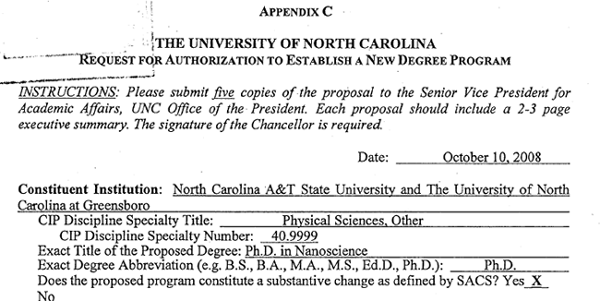 |
NC A&T and UNCG submitted
Chancellor signed Request for
Authorization to Establish a New
Degree Program , joint Ph.D. in
Nanoscience CIP 40.999 dated October
10, 2008 and joint Master of Science
in Nanoscience CIP 40.999 dated
November 21, 2008 to UNC General
Administration.
Two programs with the
same CIP code should initially be
viewed as duplicative. [UNIVERSITY
OF NORTH CAROLINA PROGRAM
DUPLICATION STUDY James H. Woodward
November 1, 2011, p.5] |
|
| |
|
Notwithstanding May 2007 UNC Board of
Governors established alleged Joint
School of Nanoscience and
Nanoengineering which was to offer a
joint interdisciplinary Ph.D. degree and
a joint professional science master's
degree.
|
|
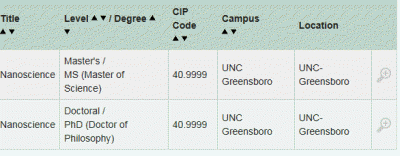 |
| |
University of North Carolina
Board of Governors
established (non-joint)
stand-alone MS in
Nanoscience on November 13,
2009, and PhD program in
Nanoscience on January 8,
2010 to HWI UNC Greensboro;
requiring UNCG students be
given the opportunity to
take relevant courses at the
School of Engineering at
North Carolina A&T
University and will be able
to work on collaborative
projects with faculty in the
School of Engineering” -
excluding HBCU (The) North
Carolina Agricultural and
Technical State University.
|
| |
|
|
|
|
A degree program is a program of study in
a discipline specialty that leads to a degree in that
distinct specialty area at a particular level of
instruction. As a general rule, in order to be
considered for degree program status, a course of study
should require at least 27 semester hours in the
proposed program area at the undergraduate level; at
least half the number of hours required for the degree
at the master’s level; and at least 21 hours in the
proposed program area at the doctoral level. [Adopted
05/06/09] |
| |
|
The National Center for
Educational Statistics (NCES), categorized Nanoscience
as CIP 15.1601 Engineering Technologies and
Engineering-Related Fields.
UNC General Administration applied
CIP 40.9999 (Physical Science) to UNCG
academic offering . Note UNC-G
has a School of Arts and Science. |
| |
For Liberal
Arts UNC Greensboro with programs in music and nursing
to offer Nanoscience degrees requires access to NCA&T
academic programs and research: “Although the degree is
in Nanoscience (does not include Nanoengineering),

students will be given the opportunity to take relevant
courses at the School of
Engineering at North Carolina A&T University and must be
able to work on collaborative projects faculty in the
School of Engineering”.
[Request
to Plan Joint NCA&T/UNCG Joint Nanoscience Ph.D.] |
| |
Doctor of Philosophy in
Nanoscience
The PhD in Nanoscience requires a
minimum of 60 hours and is designed to prepare
students to take positions in industrial,
governmental, or academic research settings by
providing a solid background in Nanoscience
theory and experimental techniques through
course work and dissertation research. |
 |
Erskine Bowles
UNC General
Administration
categorizing
Nanoscience
Ph.D. as a
Physical
Science;
examining UNC
Greensboro
curricula for
similar Physical
Science Ph.D.
programs
determined:
UNC
Greensboro
offer no
similar
Ph.D.
programs.
|
|
|
|
|
| |
|
Clearly
UNC Greensboro academic inventory was substantially
below the general rule
at least half the number of hours
required for the [Nanoscience] degree at the master’s
level; and at least 21 hours in the proposed program
[Nanoscience] area at the doctoral level. |
| |
 |
| |
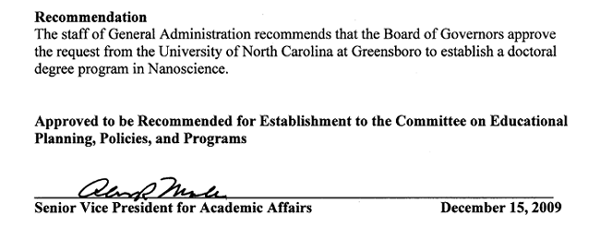 |
Greensboro native Erskine Bowles UNC System General
Administration unlawful manage and guided the degree
authorization process to excluded HBCU NCA&T from
Nanoscience degrees authorization (s) and JSNN Mission
to offer Nanoscience degrees. |
|
| |
|
| |
|
Its [UNCG] historically strong programs in music, education and
nursing are not the kinds of programs that spin off research and
development or software companies to fuel high tech economies
[Ken Mayer, Editorial, UNCG, A&T University
will need to be leaders in the charge for high-tech industry in the
Triad, Triad Business Journal Nov 9, 1998] ( Ken Mayer is former
Chairman UNCG BOT 2003-2004 & 2004-2005.] |
| |
| May 2007 UNC Board of Governors
established alleged Joint School of Nanoscience and Nanoengineering,
at bogus NC A&T / UNCG Joint Millennial campus Gateway University
Research Park, to off (a) joint interdisciplinary Ph.D. degree and
(a) joint professional science master's degree. |
|
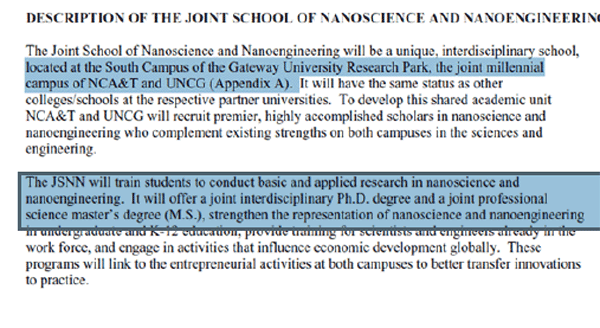 |
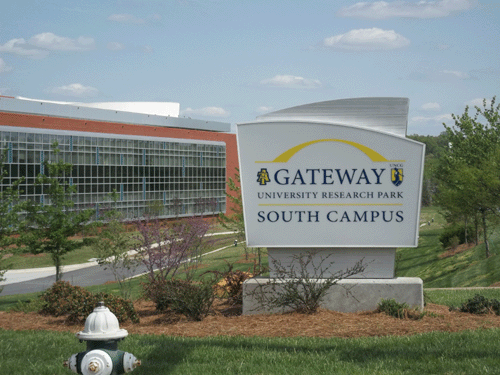 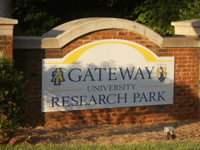 No
statuary
NCGS: 116-198.34. (8b)
NC A&T/ UNCG
Joint Millennial Campus was
designated
Oct. 2003 enabling
Greensboro Center for Innovative Development, Inc.
to administer the educational, research,
and economic development mission of a Joint Millennial
Campus and lawfully leased to the Greensboro
Center for Innovative Development, Inc. - renamed
Gateway University Research Park, Inc. No
statuary
NCGS: 116-198.34. (8b)
NC A&T/ UNCG
Joint Millennial Campus was
designated
Oct. 2003 enabling
Greensboro Center for Innovative Development, Inc.
to administer the educational, research,
and economic development mission of a Joint Millennial
Campus and lawfully leased to the Greensboro
Center for Innovative Development, Inc. - renamed
Gateway University Research Park, Inc. |
|
| |
  HBCU
institution North Carolina
A&T, one of the state's two land grant institutions, has
programs through the doctoral level. Its programs include
engineering, arts and sciences, agricultural and
environmental sciences, business and economics, education,
nursing, technology, and graduates studies.
“
The expected roles of a land-grant
institution, is
teaching agriculture and engineering, and providing
cooperative extension services”.
NC A&T's 2001 amend University
Master Plan called for developing 75 acres of land along
East Lee Street targeted to develop new opportunities for
both research and education in both the private and academic
arenas between the University's technology and agricultural
research and its students, which didn't include across-town
historical white UNC Greensboro and its members of the
Greensboro business community. HBCU
institution North Carolina
A&T, one of the state's two land grant institutions, has
programs through the doctoral level. Its programs include
engineering, arts and sciences, agricultural and
environmental sciences, business and economics, education,
nursing, technology, and graduates studies.
“
The expected roles of a land-grant
institution, is
teaching agriculture and engineering, and providing
cooperative extension services”.
NC A&T's 2001 amend University
Master Plan called for developing 75 acres of land along
East Lee Street targeted to develop new opportunities for
both research and education in both the private and academic
arenas between the University's technology and agricultural
research and its students, which didn't include across-town
historical white UNC Greensboro and its members of the
Greensboro business community. |
|
| |
Notwithstanding NCA&T's 2001
Master Plan update calling for establishing a university Millennial
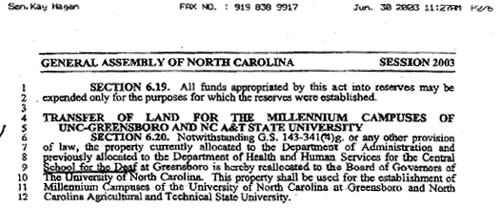 Campus
at the farm, credited in the media as the work of UNC-G district NC
Senator Kay Hagan, June 30, 2003, the General Assembly, Session Law
2003-294, Section 6.20, reallocated former Central School of the
Deaf from the State property Office to UNC BOG to be used for the
establishment of Millennium campuses of the University of North
Carolina at Greensboro and North Carolina Agricultural and Technical
State University. Campus
at the farm, credited in the media as the work of UNC-G district NC
Senator Kay Hagan, June 30, 2003, the General Assembly, Session Law
2003-294, Section 6.20, reallocated former Central School of the
Deaf from the State property Office to UNC BOG to be used for the
establishment of Millennium campuses of the University of North
Carolina at Greensboro and North Carolina Agricultural and Technical
State University. |
| |
| “`I think for the next 50 years, A&T and the
engineering programs and science programs are going to be an
integral part and a driving force in the economic development of the
community,'' said Greensboro attorney Jim Phillips Jr., a member of
the UNC Board of Governors. |
| |
|
Published as "the most plugged-in attorney in
North Carolina",
northcarolina.edu
minutes claim
Lobbyist
Greensboro Attorney Jim W. Phillips, Jr.,
Committee Budget and Finance Chair speaking
before Board of Governors stated that the Boards
of Trustees at North Carolina A&T State
University and |
|
|
the University of North Carolina at
Greensboro requested that the land
formerly designated for the Central
School for the Deaf and allocated to
the Board of Governors by the 2003
Session of the General Assembly and
a 75 - acre parcel of land
currently |
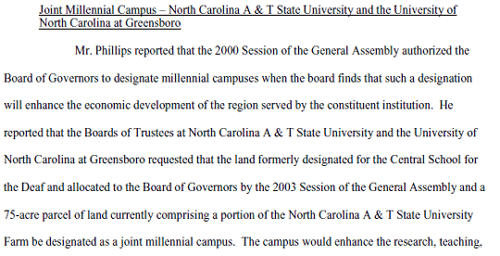 |
 comprising
a portion of the North Carolina A&T State
University Farm be designated as a Joint
Millennial Campus, alleged approved Oct. 10,
2003, at Appalachian State. comprising
a portion of the North Carolina A&T State
University Farm be designated as a Joint
Millennial Campus, alleged approved Oct. 10,
2003, at Appalachian State. |
|
| |
|
A Millennial Campus is Real Property designated
by UNC Board of Governors pursuant
NCGS116-198.34 (8b) which says in part: Upon
formal request by the constituent institutions,
the Board of Governors may authorize two or more
constituent institutions which meets the
requirements of this section to create a joint
Millennial Campus.
§ 116-198.34. General Powers of Board of
Governors.
|
| |
Public Record
Reply
from UNC-Greensboro for statutory required
request to establish a Joint Millennial Campus
produced alleged Chancellors signed

Document dated Aug. 22nd, 2003.
Alleged Chancellors signed document stated: "we
are pleased to inform you that this proposal has
been approved by both of our Boards of Trustees
and is supported by local community leaders and
organizations including Action Greensboro. Note:
Action Greensboro sole member in 2005 was the
Greensboro Chamber of Commerce. Copies
of the Resolutions passed by the N.C. A&T State
University Board of Trustees on August 22, 2003
and by The University of North Carolina at
Greensboro Board of Trustees on August 22, 2003
are enclosed. |
| |
Recommended by Chancellors Renick and Sullivan,
NC A&T and UNC-G Board of
 Trustees
duplicate Resolutions: In Support of The
Creation of a Joint Millennial Campus between NC
A&T and UNCG, dated
Aug. 22, 2003,
and
Aug. 28, 2003 , called for seeking
designation of Joint Millennial Campus in terms
of the Central North Carolina School of the
Deaf real estate, transferred to UNC Board of
Governors for the purpose of establishing a
Joint Millennial Campus. Universities'
resolutions seek designation of Joint
Millennial without a syllable pertaining to
a 75-acre parcel of NCA&T farmland, statutory
foreclosed Phillips alleged NCA&T/UNCG Joint
Millennial Campus
inclusive of NC A&T Farmland. Trustees
duplicate Resolutions: In Support of The
Creation of a Joint Millennial Campus between NC
A&T and UNCG, dated
Aug. 22, 2003,
and
Aug. 28, 2003 , called for seeking
designation of Joint Millennial Campus in terms
of the Central North Carolina School of the
Deaf real estate, transferred to UNC Board of
Governors for the purpose of establishing a
Joint Millennial Campus. Universities'
resolutions seek designation of Joint
Millennial without a syllable pertaining to
a 75-acre parcel of NCA&T farmland, statutory
foreclosed Phillips alleged NCA&T/UNCG Joint
Millennial Campus
inclusive of NC A&T Farmland.
NCA&T: "As to your prior request for the
resolution/motion about the 75 acres of land
being a part of the Gateway Research Park, There
is no 2003 resolution, etc. that specifically
says 75 acres are involved." determined J.
Charles Waldrup J.D., Ph.D. General Counsel
Office Of Legal Affairs North Carolina
Agricultural & Technical State University.
NC A&T
Resolutions:
In Support of The Creation of a Joint Millennial
Campus
maybe Bogus.
|
| |
|
Lease was smoking gun NCA&T/UNCG Joint
Millennial Campus was not designated |
| |
| UNC Constituent
Universities and General Administration may
acquire or dispose of property by lease. (UNC
Policy Manual 600.1.3 ). Any proposal involving
the acquisition or disposition by the
institution of any interest in real property
shall be recommended by the Board of Trustees.
All real property transactions that require
approval beyond the campus level are to be
initiated by submission of the Form PO-1 for
acquisitions and the Form PO-2 for dispositions
to the State Property Office. |
| |
| Feb. 2, 2006, Action Item:
Lease Agreement between the Greensboro
Center for Innovative Development and
UNCG and NC A&T, was considered by
UNCG Board of Trustees. Action item
background information timeline from
Feb. 2003 through Feb2, 2006 didn't
indicated JMC was designed by UNC BOG.
|
| |
| Action Item background information
says " in order to facilitate the GCID
ability to perform its role as
managed/developer it was determined by
counsel for the universities and the
GCID to pursue a master lease for the
properties identified as the JMC by
university counsels, GCID, and General
Administration. |
|
 |
| The Identified JMC property
consisted of land owned by the State of
North Carolina (Approximately 75 acres
with 142,000 square feet of existing
space at the former Central North
Carolina School for the Deaf and
approximately 75 acres adjacent to the
NCA&T farm).... which unambiguous
constitute the UNC Board of Governors
alleged Oct. 10, 2003 designated
NCA&T/UNC-G Millennial Campus. Lease
Background said " This document has also
been reviewed by the Office of the
President (Bowles)." UNC-Greensboro
Board of Trustees Approved the Lease.
|
|
| |
|
| |
| Whereas UNC
System General Administration is not a
constituent university and
the Millennial Campus Statue
does not provide for
the General Administration to create an NC G.
S.: 116-198.34. (8b) Joint Millennial Campus and
UNC Policy Manual 600.1.3 limits
the President to acquisition of Real Property to
$25,000 or less without Board of Governors
approval and any proposal involving the
acquisition or disposition by the institution of
any interest in real property shall be
recommended by the Board of Trustees. |
| |
 |
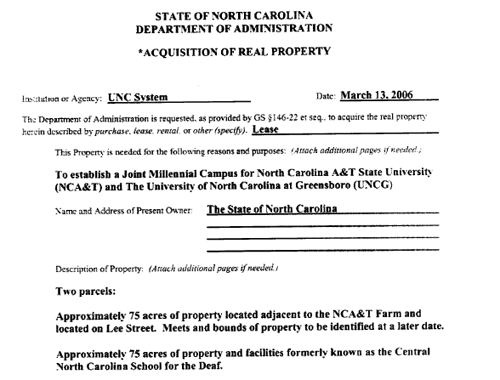 |
|
Erskine
Bowles UNC System Acquisition of
Real Property by lease P0-1 dated
March 13, 2006 for the purpose of
establishing a Joint Millennial
Campus for North Carolina A&T
|
| |
State University
and The University of North Carolina
Greensboro. Unequivocal
extinguished UNC Board of
Governors alleged Joint Millennial
Campus - North Carolina A&T State
 University
and the University of North
Carolina Greensboro - false claim
Oct. 10, 2003 designation of the
Central School of the Deaf
reallocated to the Board of
Governors and 75-acre parcel on
NCA&T farmland as Joint Millennial
Campus. University
and the University of North
Carolina Greensboro - false claim
Oct. 10, 2003 designation of the
Central School of the Deaf
reallocated to the Board of
Governors and 75-acre parcel on
NCA&T farmland as Joint Millennial
Campus. |
|
|
|
| |
| |
Fraudulent
claiming HBCU NC A&T and HWI UNCG were partners in
NCA&T/UNCG Joint Millennial Campus. May 2007 UNC
Board of Governors established alleged Joint School
of Nanoscience and Nanoengineering, at bogus NC A&T
/ UNCG Joint Millennial campus Gateway University
Research Park, to offer (a) joint interdisciplinary
Ph.D. degree and (a) joint professional science
master's degree.
|
 |
| |
| NC A&T and UNCG
submitted Request for Authorization to Establish a
New Degree Program , Ph.D. in Nanoscience dated
October 10, 2008 and Master of Science in
Nanoscience dated November 21, 2008 to UNC General
Administration, CIP discipline 40.999.
Two programs with the same CIP code
should initially be viewed as duplicative. [UNIVERSITY
OF NORTH CAROLINA PROGRAM DUPLICATION STUDY James
H. Woodward November 1, 2011, p.5] |
 |
| |
For Liberal Arts UNC
Greensboro with programs in music and nursing to
offer Nanoscience degrees requires access to NCA&T
academic programs and research: “Although the
degree is in Nanoscience (does not include
Nanoengineering),

students will be given the opportunity to take
relevant courses at the
School of Engineering at North Carolina A&T
University and must be able to work on collaborative
projects with faculty in the School of Engineering”.
[Request
to Plan Joint NCA&T/UNCG Joint Nanoscience Ph.D.] |
| |
|
 |
| The University of
North Carolina Board of Governors established
(non-joint) stand-alone MS in Nanoscience on
November 13, 2009, and PhD program in Nanoscience
on January 8, 2010 to HWI UNC Greensboro;
in which UNCG
students will be given the opportunity to take
relevant courses at the School of Engineering at
North Carolina A&T University and will be able to
work on collaborative projects with faculty in the
School of Engineering” -
excluding HBCU (The)
North Carolina Agricultural and Technical State
University which has an Engineering School.
|
|
| |
|
 |
| |
|
 |
| |
|
|
| |
 |
| |
UNC Policy
for Interdisciplinary Degree
An Interdisciplinary Degree program involves two or
more academic units, either on the same or different
campuses in a formal agreement to offer a
program of study drawing on two or more disciplines
that will result in a student being awarded an
interdisciplinary degree. If more than one campus is
involved in offering the program it would also be a
joint degree.
JSNN Management Agreement Dated March 03, 2008
constituted a formal agreement to offer a Joint
Nanoscience MS and PhD degrees between NCA&T and
UNCG. UNCG Nanoscience MS and PhD degrees were
non-joint, stand-alone degrees which meant no formal
agreement exited between UNC Greensboro and NC A&T
therefore no educational bases exist for UNCG
students to take courses at NCA&T School of
Engineering and work on Cooperative research with
the faculty in the school of Engineering. |
|
| |
|
| |
|
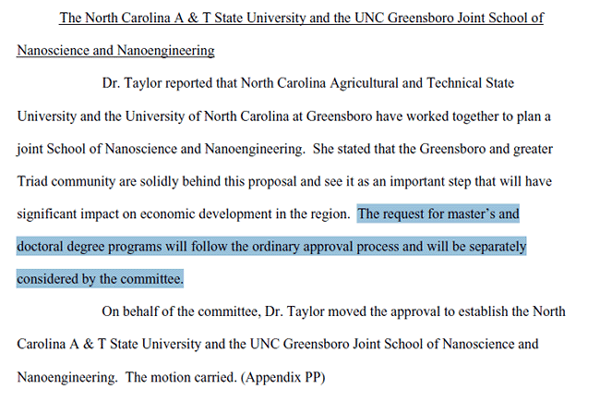 |
|
UNC Board of
Governors
Minutes May 2006 |
|
|
| |
|
Policy on Academic Program Planning |
 |
|
The UNC Policy
Manual 400.1.1.1[G] Adopted 05/06/09 |
| |
 |
 |
|
Examining Nanoscience discipline
file at
www.northcarolina.edu
:
1.
The discipline file contained
no UNCG Notification to plan a
master’s in Nanoscience,
2.
The discipline file
contained an unsigned
“Revised UNCG Request to
Establish a Master’s in
Nanoscience,
3.
The discipline file contained no
UNCG Request to plan a PhD in
Nanoscience
4.
The discipline file contained no
UNCG Request to Established a
PhD in Nanoscience |
| |
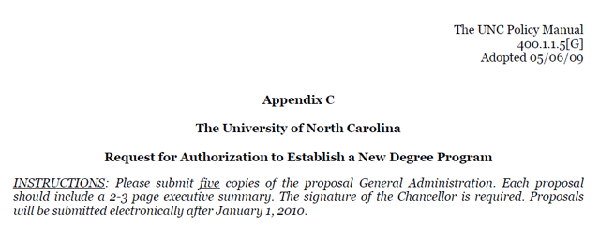 |
 |
|
Chancellor signature
certifies proposal [UNC
Policy Manual
400.1.5(G)] to establish
new degree program was
reviewed and approved by
the appropriate campus
committees and
authorities. |
|
| |
|
Responding to a Public
records request to Dr.
David H. Perrin UNCG
Provost & Executive Vice
Chancellor,1/7/11, for a
copy of an UNCG
chancellor signed
request to establish
stand alone Masters and
PhD Nanoscience degrees
at UNCG, Counsel
Steve Serck responded
"In
response to your request
of 1/7/11, no such
documents as you
described exists."
|
| |
|
Unambiguous lack of
UNCG Chancellor
Dr. Linda Brady signed
Proposals requesting to
establish Nanoscience
Professional Master of
Science in Nanoscience
and Ph.D. Nanoscience
clearly demonstrated
UNCG had not
expressed intentions to
establish the degrees,
they had not been
approved by the faculty
and administration, were
not pursuant UNC
Policies
400.1.1,1[G]and
400.1.1.5[G].
|
| |
|
|
 |
|
|
|
 |
|
[SECTION
301. THE STANDING COMMITTEES’ JURISDICTION] |
| |
|
|
 |
|
Policy on Academic Program Planning The
UNC Policy Manual 400.1 Adopted 05/06/09 |
|
| |
|
|
|
|
| |
|
|
|
Early in the investigation of lack of supporting
documentation for UNCG Nanoscience degree
authorizations Dr. James Sadler Associate Vice
President for Academic Planning University of
North Carolina put forth a chronology of
authorizations (e-mail (08/04/2010). |
| |
|
|
May 11, 2007
Board of Governors authorizes
establishment of the Joint School of
Nanoscience and Nanoengineering.
You ask about any request to amend the
Joint School, but I am not aware of any
request. Emphasis added |
| |
| Alleged,
NC A&T Dr. Alton Thompson, Interim
Provost and Vice Chancellor for Academic
Affairs and UNCG Dr. David H. Perrin,
Provost and Vice Chancellor for Academic
Affairs, in letter dated August 5,
2009 to Dr. Belle Wheelan said this
letter is in response to your letter
dated March 17, 2009 , enclosure. |
| |
 |
|
3. Principles of
Accreditation, Comprehensive Standard
3.4.6 |
|
|
|
Principles
Relevant to All Joint Curricular
Ventures (3.), The Joint school of
Nanoscience and Nanoengineering (JSNN)
has been formed as a joint venture of
two regionally accredited institutions.
The General Administration of the
University of North Carolina system
approved the formation of the school.
The amended and restated JSNN management
agreement is attached to this document
(Appendix 1). 
When
approval is received from the UNC
System, the faculty approval of the
degree programs and courses will then
follow the procedures outline in the
faculty handbooks at the respective
campuses.
Dr. Sadler's
Comment " You ask about any
request to amend the Joint School, but I
am not aware of any request"
indicated approval had not been
received for University of North
Carolina General Administration approved
JSNN depicted in Amended and Restated
Management Agreement and faculty
approval of the degree programs
followed. |
|
| |
|
|
Sadler: October 7, 2009
Videoconference
panel discussion of the proposed MS in
Nanoscience. Dean Jim Ryan of the Joint School
of Nanoscience and Nanoengineering made the
presentation and Dr. Ken Murray, NCA&TSU
Associate Vice Chancellor for Academic Affairs
and Interim Dean for Graduate Studies,
participated. It was at this meeting that
UNC-GA was informed that UNCG and NCA&T had
agreed to offer separate degrees through the
Joint School of Nanoscience and Nanoengineering,
with UNCG offering the Nanoscience degrees and
NCA&T offering the Nanoengineering degrees.
Dean Ryan was told that UNCG needed to submit a
revised request to establish. Both the original
and the revised requests are available at this
site: emphasis added. |
| |
|
|
Dr. Sadler Chronology acknowledge the unsigned
alleged “Revised UNCG Request to Establish a
Master’s in Nanoscience dated Nov. 9, 2009 was
JSNN Dean Jim Ryan; Chronology does not
reference
Second Document Page 9 UNC GA/Questions
from UNC General Administration’s which says "
General Administration notes that the original
Memorandum of Agreement between the two
institutions does not clearly distinguish many
of these issues or is contrary to methods now
 recommended
by General Administration. As such, the
Memorandum from March 3, 2008 needs to be
revised, updated, and reapproved."; resulting
Amended and Restated Management Agreement dated
April 24, 2009 pursuant Public Record Requests
was addressed to Dr. Harold Martin, allegedly
copied to members of the General Administration
including Dr. Jim Saddler, whose Article 5.
Curriculum/degrees Degrees. Nanoengineering
degrees will be awarded by NC A&T, Nanoscience
degrees will be awarded by UNCG. Furthermore
alleged UNCG Revised Proposal appears to be
schedule the same day as NC A&T and UNCG
Proposal Oct. 7th, 2009. recommended
by General Administration. As such, the
Memorandum from March 3, 2008 needs to be
revised, updated, and reapproved."; resulting
Amended and Restated Management Agreement dated
April 24, 2009 pursuant Public Record Requests
was addressed to Dr. Harold Martin, allegedly
copied to members of the General Administration
including Dr. Jim Saddler, whose Article 5.
Curriculum/degrees Degrees. Nanoengineering
degrees will be awarded by NC A&T, Nanoscience
degrees will be awarded by UNCG. Furthermore
alleged UNCG Revised Proposal appears to be
schedule the same day as NC A&T and UNCG
Proposal Oct. 7th, 2009. |
| |
|
|
|
Dr. Sadler Chronology acknowledged
unsigned
alleged “Revised UNCG Request to
Establish a Master’s in Nanoscience
dated Nov. 9, 2009 was submitted by JSNN
Dean Jim Ryan; |
| |
|
From:
James C. Sadler < >
Date: Sun, Oct 11, 2009 at
10:07 AM
Subject: Re: Revised version
of the Request to Establish
the Professional Master of
Science in Nanoscience
degree program
To: James Ryan <j>
Cc:
dhprrin@uncg.edu,
James C Petersen JCPETERS <
>,
altont@ncat.edu,
kmurray@ncat.edu
Thanks, Jim. I'll confer
with Alan about the Ph.D.
and whether anything is
needed. Jim Sadler
James Ryan wrote:
Jim,
I have attached a revised
version of the Request to
Establish for the
Professional Master of
Science in Nanoscience. I
have included the most
recent update of the JSNN
Management Agreement as well
as revised figures on
enrollment. I have also
provided additional
explanation to address
questions that were asked
during the disciplinary
committee review on
Wednesday. Please review and
let me know if additional
information or clarification
is needed.
Also, similar revisions are
needed for the Request to
Establish the Ph.D. in
Nanoscience. Should I send
the latest version of that
document to you as well?
Thank you.
Jim
James C.
Sadler, Ph.D. Associate Vice
President, Academic Planning
Interim Assoc. VP,
Institutional Research &
Analysis UNC General
Administration |
|
|
| |
|
|
|
|
| |
|
|
December 9, 2009
UNC Graduate Council recommends authorization of
the joint PhD. |
| |
|
|
| |
January 8, 2010
UNC Board of Governors authorizes the
UNCG PhD in Nanoscience based on the
revised request submitted. |
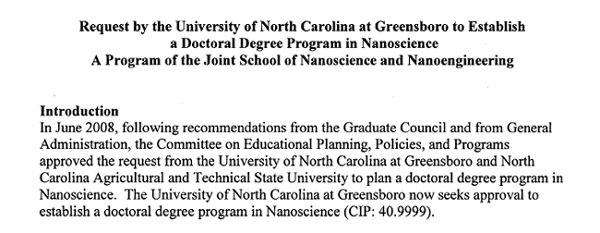 |
|
| |
|
|
| |
|
|
| |
|
JSNN Management Agreement
March 03, 2008 |
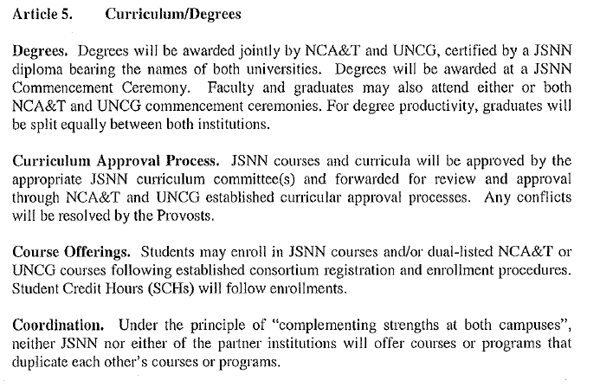 |
|
Pursuant JSNN Management Agreement March
03, 2008 Curriculum Approval Process JSNN
courses and curricula will be forwarded for
review and approve through NCA&T and UNCG
established curricular approval processes. |
| |
|
|
|
Amended and
Restated Management Agreement |
 |
| |
|
Pursuant Amended and Restated
Management Agreement curriculum
approval Process JSNN Dean Ryan
alleged UNC Greensboro Revised
Request to establish Nanoscience
M.S. should have been submitted
to UNC Greensboro for review and
approval through established
curricular approval process. |
|
| |
|
Responding to a Public
records request to Dr. David H. Perrin
UNCG Provost & Executive Vice
Chancellor,1/7/11, for a copy of an UNCG
chancellor signed request to
establish stand alone Masters and PhD
Nanoscience degrees at UNCG,
Counsel Steve Serck responded
"In response to
your request of 1/7/11, no such
documents as you described exists." ;
Unambiguous JSNN Dean Ryan's alleged
UNCG Revised Proposal had not been
submitted to UNC
Greensboro and NCA&T for review
and approval through established
curricular approval process; nor
constituted an UNC Greensboro request
for authorization to Establish a Master
of Science in Nanoscience and, or
Request by the University of North
Carolina at Greensboro to Establish a
Doctoral Degree Program in Nanoscience. |
|
|
|
| |
|
| |
 |
 |
| |
|
|
Requests to UNC-GA for a
UNCG Request to Plan a
PhD and Request to
Establish a standalone
PhD in Nanoscience
proscribed by UNC
Guidelines for Academic
Program Development
subsection (B) related
to degree authorization
Ms. Joni Worthington
(UNC-GA) responded to
a public record request
for a UNCG Chancellor
signed request to plan
and establish a PhD in
Nanoscience said: “Dr.
Alan Mabe in his
capacity as Senior Vice
President for Academic
Affairs determined:
·
UNCG was
not required to submit a
new request to plan a
Ph.D. in Nanoscience.
The joint proposal
submitted by UNCG and
NCA&T was deemed
sufficient for the
campus to move forward
with planning a
stand-alone degree
program.
·
UNCG was
not required to submit a
new request to establish
a Ph.D. in Nanoscience.
The joint request
submitted by UNCG and
NCA&T, which had already
been recommended for
approval by the UNC
Graduate Council, was
deemed sufficient for
Board consideration. The
Board of
Governors concurred with
that determination in
approving the
establishment of the
program. (E-mail 10.08.
2010) “ |
|
|
|
|
Contradicting
assertions Dr. Mabe in the capacity of Senior VP for
Academic Affairs etc., are Board approved Guidelines
for Academic Program Development subsection (B.)
Academic Program Development Requiring Authorization or
Action Beyond the Campus Level, which says The
chancellors of the constituent institutions shall
communicate to General Administration of the University
their intentions or requests with respect to
instructional program development for Request for
authorization to plan a new degree program at the
doctoral or first professional level and Request for
authorization to establish a new degree program.
[Guidelines for Academic Program Development [The UNC
Policy Manual 400.1.1.1[G] Adopted 05/06/09].
|
| |
|
| |
|
|
|
 |
| |
|
| UNC System Board of Governors May
2007 approved Joint school of Nanoscience and Nanoengineering in
which JSNN will offer a joint interdisciplinary Ph.D. degree
and a joint professional science master's degree (M.S.) |
|
| |
|
 |
|
Policy on Academic Program Planning The UNC Policy Manual
400.1 Adopted 05/06/09 |
|
|
| |
|
| |
|
| Alleged, NC A&T Dr. Alton
Thompson, Interim Provost and Vice Chancellor for Academic
Affairs and UNCG Dr. David H. Perrin, Provost and Vice
Chancellor for Academic Affairs, in letter dated August
5, 2009 to Dr. Belle Wheelan said this letter is in
response to your letter dated March 17, 2009. |
|
|
 |
| |
| A management
Agreement .. has been formulated and has recently
been amended and restated to conform to the "new
policies of the University of North Carolina System".
|
|
|
|
| |
|
 |
|
3. Principles of Accreditation, Comprehensive
Standard 3.4.6 |
|
|
|
Principles Relevant to
All Joint Curricular Ventures (3.), The Joint school of Nanoscience
and Nanoengineering (JSNN) has been formed as a joint venture of two
regionally accredited institutions. The General Administration of
the University of North Carolina system approved the formation of
the school. The amended and restated JSNN management agreement is
attached to this document (Appendix 1). 
When approval is
received from the UNC System, the faculty approval of the degree
programs and courses will then follow the procedures outline in the
faculty handbooks at the respective campuses.
Dr. Sadler's Comment "
You ask about any request to amend the Joint School,
but I am not aware of any request" indicated approval had
not been received for University of North Carolina General
Administration approved JSNN depicted in Amended and Restated
Management Agreement and faculty approval of the degree programs
followed. |
| |
|
| |
|
 |
|
| |
|
 |
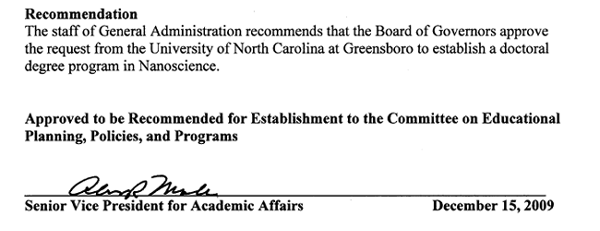 |
| |
 |
| |
| UNC General Administration and Senior Vice President Alan Mabe
use the authority to manage the review process to implement the UNC
System Approve Amended and restated Management Agreement
Circular/degrees UNC Greensboro will offer nanoscience degrees in
lieu of the Board of Governors May 2007 approved JSNN in which
Nanoscience degrees were joint. |
| |
|
|
|
|
The UNC Policy Manual 400.1.1.1[G]
 |
A degree program is a program of study in a discipline
specialty that leads to a degree in that distinct specialty
area at a particular level of instruction. As a general
rule, in order to be considered for degree program status, a
course of study should require at least 27 semester hours in
the proposed program area at the undergraduate level; at
least half the number of hours required for the degree at
the master’s level; and at least 21 hours in the proposed
program area at the doctoral level. [Adopted
05/06/09] |
|
| |
| |
|
|
| |
|
Elizabeth City State University requested authorization to
establish a BS in Engineering Technology (CIP 15.9999)
in January 2006. The proposed degree will offer
concentrations in “Computer and Information Technology” and
“Mechanical and Automation.” The program will be housed in
the Department of Technology, which currently offers BS
degrees in Industrial Technology and Aviation Science. The
proposed program will incorporate some existing industrial
technology and computer courses into the curriculum. UNC
Board of Governors 8/11/06 authorize BS Engineering
Technology CIP 15.999 to in 2006 Elizabeth City State |
| |
|
|
|
| |
| The National Center for
Educational Statistics (NCES) responsible for collecting and
presenting statistical data and information for the nation;
classifies Nanoscience and Nanoengineering as Nanotechnology CIP
15.1601: Engineering technologies and Engineering related fields. |
| |
|
Nanotechnology. Definition: A program that prepares
individuals to apply mathematical, scientific, and engineering
principles and technical skills to manipulate matter at the atomic
and molecular level (in the range of 1-100 nanometers) and to
design, fabricate, and integrate nanoscale structures, devices, and
systems. Includes instruction in materials science,
thermodynamics, nanomaterials, Nano electronics, and nano/micro
device fabrication and testing. [https://nces.ed.gov/search/?q=nano+science]:
|
| |
 |
|
PCG/UNC-NCCCS/UNC
Interim report 3.doc/RB.SP.PC.CR.ATPCC.1/CC.14/10May05
|
|
| |
|
 |
|
University of North Carolina at Greensboro 2008-2009
Profile |
|
| |
|
Notwithstanding the
National Center for Educational Statistics (NCES),
categorized Nanoscience as CIP 15.1601 Engineering
Technologies and Engineering-Related Fields.
UNC General Administration applied
CIP 40.9999 (Physical Science) to UNCG academic
offering . Note UNC-G has a School of Arts and
Science. |
 |
|
| Note
Fall 2005 UNC Presidency transition from
President Molly Broad
to Erskine Bowles. |
|
| |
Professional Master of
Science in Nanoscience
The 33-hour, non-thesis MS in Nanoscience follows the
Professional Master of Science degree model, featuring
course work in Nanoscience and business and an internship to
provide practical experience. |
| |
 |
|
UNC General Administration applied
CIP 40.9999 (Physical Science) to UNCG academic
offering determined UNC
at Greensboro offered only a Master in
Chemistry on the graduate level in the
category of Physical Science. |
|
|
| |
|
Unambiguous a degree in Chemistry is not
a degree in Nanoscience. UNC Greensboro academic inventory was
substantially below the general rule of
at least half the number of hours required for
discipline [Nanoscience] degree at the master’s level.
|
| |
Doctor of Philosophy in Nanoscience
The PhD in Nanoscience requires a minimum of 60 hours and is
designed to prepare students to take positions in industrial,
governmental, or academic research settings by providing a solid
background in Nanoscience theory and experimental techniques through
course work and dissertation research. |
| |
 ”The addition
of a doctoral program is not
an easy or simple extension
of the master’s program.
Unlike most master’s
programs, a doctoral program
is research-based. While
doctoral program
requirements routinely
include additional course
work, the central program
requirement is the
dissertation. The topic for
the dissertation normally
derives from discussion with
faculty who are engaged in
research and therefore
knowledgeable about the
“frontier of knowledge” in
the discipline. For a
faculty member to then
properly guide and assist
the student’s dissertation
research, that faculty
member must be an active
researcher. Hence, the
implementation of a doctoral
program must be preceded by
the assembling of faculty
who are conducting
publishable research in that
discipline.
UNIVERSITY OF NORTH CAROLINA
PROGRAM DUPLICATION STUDY
Submitted by James H.
Woodward November 1, 2011
p12] ”The addition
of a doctoral program is not
an easy or simple extension
of the master’s program.
Unlike most master’s
programs, a doctoral program
is research-based. While
doctoral program
requirements routinely
include additional course
work, the central program
requirement is the
dissertation. The topic for
the dissertation normally
derives from discussion with
faculty who are engaged in
research and therefore
knowledgeable about the
“frontier of knowledge” in
the discipline. For a
faculty member to then
properly guide and assist
the student’s dissertation
research, that faculty
member must be an active
researcher. Hence, the
implementation of a doctoral
program must be preceded by
the assembling of faculty
who are conducting
publishable research in that
discipline.
UNIVERSITY OF NORTH CAROLINA
PROGRAM DUPLICATION STUDY
Submitted by James H.
Woodward November 1, 2011
p12]
|
| |
| UNC at Greensboro 10th
among the 11 institutions conducted $45,000 dollars of
Nanotechnology research between 2000 thru 2005. NCA&T was 4th in Funding in Nanotechnology Research
at North Carolina Universities with $11 Million Dollars between
2000-2005.
|
|
| |
Erskine Bowles
UNC General
Administration
categorizing
Nanoscience Ph.D. as
a Physical Science;
examining UNC
Greensboro curricula
for similar Physical
Science Ph.D.
programs
determined:
UNC Greensboro offer
no similar Ph.D.
programs.
|
|
|
 |
|
|
|
Clearly UNC
Greensboro academic
inventory was
substantially below
the general rule
at least half the
number of hours
required for the
[Nanoscience] degree
at the master’s
level; and at least
21 hours in the
proposed program
[Nanoscience] area
at the doctoral
level. |
| |
|
Unambiguous
UNC-Greensboro
academic inventory
of Doctoral degrees
in English:
Psychology:
Education:
Counseling;
Geography, Nursing;
Nutrition;
Performance; Human
Development and
Family Studies;
Exercise and Sport
Science; Curriculum
and Teaching;
Information systems
and Operations
management;
consumer, apparel,
and Retail studies;
and Music is ill
prepared to offer “A
program that
prepares individuals
to apply
mathematical,
scientific, and
engineering
principles and
technical skills to
manipulate matter at
the atomic and
molecular level (in
the range of 1-100
nanometers) and to
design, fabricate,
and integrate
nanoscale
structures, devices,
and systems. |
|
|
|
|
|
|
|
|
| |
| The National Center for
Educational Statistics (NCES) responsible for collecting and
presenting statistical data and information for the nation;
classifies Nanoscience and Nanoengineering as Nanotechnology CIP
15.1601: Engineering technologies and Engineering related fields. |
| |
|

|
 Historical
Black Land Grant NCA&T was listed as University focus on
Nanotechnology May
2005. Historical
Black Land Grant NCA&T was listed as University focus on
Nanotechnology May
2005.
Cross town Historical White UNC Greensboro was
not listed as a University focused on Nanotechnology. |
|
| |
|
Dr. Alan Mabe
dated April 28, 2009
to Ed Planning,
Ph.D. Memorandum
degree
proposals indicate
NC A&T Nanoscience
and Material Science
(Nanoengineering). |
|
|
 |
| |
|
The UNC Policy Manual 400.1.1.1[G]
 |
A degree program is a program of study in a discipline
specialty that leads to a degree in that distinct specialty
area at a particular level of instruction. As a general
rule, in order to be considered for degree program status, a
course of study should require at least 27 semester hours in
the proposed program area at the undergraduate level; at
least half the number of hours required for the degree at
the master’s level; and at least 21 hours in the proposed
program area at the doctoral level. [Adopted
05/06/09] |
|
| |
|
 |
|
PCG/UNC-NCCCS/UNC
Interim report 3.doc/RB.SP.PC.CR.ATPCC.1/CC.14/10May05
|
|
| |
|
Historical
black North
Carolina
A&T, as one
of the
state's two
land grant
institutions,
has programs
through the
doctoral
level. Its
programs
include
engineering,
arts and
sciences,
agricultural
and
environmental
sciences,
business and
economics,
education,
nursing,
technology,
and
graduates
studies.
“The
expected
roles of a
land-grant
institution,
is teaching
agriculture
and
engineering,
and
providing
cooperative
extension
services” . |
 |
|
UNC Board of Governors January 2007
authorized UNC Charlotte, which has an Engineering
School, to offer a Ph.D. in Nanoscale Science. Offering
Nanoscale Science was not a Substantial Change as
defined by the SACS for UNC Charlotte. Nov. 2012 UNC
Board of Governors authorized a Master’s in
Nanoengineering to Land Grant Institution NC State,
which has an Engineering. Offering Nanoengineering was
not a Substantial
Change as defined by
the SACS for NC
State.
Consistent
with other
engineering
schools in
the UNC
System
offering
Nanoscience
and
Nanoengineering
(Material
Science)
programs
are not
Substantial
Changes as
defined by
the SACS and
consistent
with the
education,
curricular,
mission and
goals of NC
A&T State
University. |
|
| |
|
| |
In order for white Liberal Arts UNC-G with programs in music,
art, and nursing to offer Nanoscience degrees it must access NC A&T
academic circular and research.
“Although the degree is in Nanoscience (does not include
Nanoengineering), students will be given the opportunity to take
relevant courses at the School of Engineering at North Carolina
A&T University and will be able to work on collaborative projects
with faculty in the School of Engineering”.
|
 |
|
Request
to Plan Joint NCA&T/UNCG Joint Nanoscience Ph.D. |
|
| |
|
Unlike land grant cross-town historical Black
NCA&T with strong programs in engineering
offering Nanoscience constituted a Substantive
Change as defined by SACS from previous approved
circular at historical white women UNC
Greensboro Liberal Arts with nursing and
music programs . (UNCG) Rebecca Adams to
(SACS) Tom Benberg: Sarah Armstrong Subject:
Request for interpretation of accuracy of
nanoscience message, April 13, 2010:
The bottom line, however, is that we need to
submit a full prospectus and need to do so as
soon as possible. This request will be for
approval to initiate a new off-campus site
(South Campus) and to initiate a new degree
program (MS in Nanoscience) at that site.
Contrary to previous interpretations, both
represent substantive changes.. Due to the
confusion, they are willing to waive the
requirement that we do so 6 months in advance
and will usher it though the approval process in
a timely way so that we can accept students into
UNCG's MS in Nanoscience program next fall. |
|
|
| |
|
Unambiguous UNC-Greensboro academic inventory of
Doctoral degrees in English: Psychology: Education: Counseling;
Geography, Nursing; Nutrition; Performance; Human Development and
Family Studies; Exercise and Sport Science; Curriculum and Teaching;
Information systems and Operations management; consumer, apparel,
and Retail studies; and Music is ill prepared to offer “A program
that prepares individuals to apply mathematical, scientific, and
engineering principles and technical skills to manipulate matter at
the atomic and molecular level (in the range of 1-100 nanometers)
and to design, fabricate, and integrate nanoscale structures,
devices, and systems. |
|
|
|
|
|
|
The National
Center for
Educational
Statistics (NCES)
responsible
for
collecting
and
presenting
statistical
data and
information
for the
nation;
classifies
Nanoscience
and
Nanoengineering
as
Nanotechnology
CIP 15.1601:
Engineering
technologies
and
Engineering
related
fields. |
| |
|
 |
|
PCG/UNC-NCCCS/UNC
Interim
report
3.doc/RB.SP.PC.CR.ATPCC.1/CC.14/10May05 |
|
| |
|
 |
|
University
of
North
Carolina
at
Greensboro
2008-2009
Profile |
|
|
|
|
|
A&T is known for its
engineering and
agricultural
programs and UNCG’s
background is
nursing and the
humanities “. [1] |
|
|
For Liberal Arts UNC
Greensboro with
programs in music
and nursing to offer
Nanoscience degrees
requires access to
NCA&T academic
programs and
research: “Although
the degree is in
Nanoscience (does
not include
Nanoengineering),

students will be
given the
opportunity to take
relevant courses at
the
School of
Engineering at North
Carolina A&T
University and will
be able to work on
collaborative
projects with
faculty in the
School of
Engineering”.
[Request
to Plan Joint
NCA&T/UNCG Joint
Nanoscience Ph.D.] |
|
|
|
Unambiguous UNC
Policy on Academic
Program Planning
conclusion if it had
been implemented
would indicate : |
(1) number,
location, and
mode of delivery
of existing
programs,
(2) the
relation of the
program to the
distinctiveness
of the campus
and the mission
of the campus,
(3) the
demand for the
program in the
locality,
region, or State
as a whole,
(4) whether
the program
would create
unnecessary
duplication,
(5)
employment
opportunities
for program
graduates,
(6) faculty
quality and
number for
offering the
program,
(7) the
availability of
campus resources
(library, space,
labs, equipment,
external
funding, and the
like) to support
the program,
(8) the
number and
quality of
lower-level and
cognate programs
for supporting
the new program,
(9) impact of
program decision
on access and
affordability,
(10) the
expected quality
of the proposed
degree program,
|
|
over whiningly
indicated
Nanoscience and
Nanoengineering
degrees be
established at
HBCU (The) North
Carolina
Agricultural and
Technical State
university
"not"
University of North
Carolina Greensboro. |
|
|
|
|
Why is
across-town Liberal
Art UNC Greensboro
with programs in
music and nursing,
requiring relevant
courses be taken at
the School of
Engineering at North
Carolina A&T
University and will
be able to work on
collaborative
projects with
faculty in the
School of
Engineering”, except
for unvarnished
racism offering
Nanotechnology
degrees? |
|
|
|
|
1]
MARTA HUMMEL Staff
Writer, A&T ENTICES
SCIENCE CENTER TO
GREENSBORO - N.C.
A&T AND THE USDA
HOPE THEIR AGREEMENT
WILL MAKE GREENSBORO
A HUB FOR BIOFUELS
AND FARMING
RESEARCH. Greensboro
News & Record
(NC)-September 20,
2004
[2]
UNIVERSITY OF NORTH CAROLINA
PROGRAM DUPLICATION STUDY
Submitted by James H.
Woodward November 1, 2011
p12]
|
 Campus
at the farm, credited in the media as the work of UNC-G district NC
Senator Kay Hagan, June 30, 2003, the General Assembly, Session Law
2003-294, Section 6.20, reallocated former Central School of the
Deaf from the State property Office to UNC BOG to be used for the
establishment of Millennium campuses of the University of North
Carolina at Greensboro and North Carolina Agricultural and Technical
State University.
Campus
at the farm, credited in the media as the work of UNC-G district NC
Senator Kay Hagan, June 30, 2003, the General Assembly, Session Law
2003-294, Section 6.20, reallocated former Central School of the
Deaf from the State property Office to UNC BOG to be used for the
establishment of Millennium campuses of the University of North
Carolina at Greensboro and North Carolina Agricultural and Technical
State University. 











 In
2003-04, with the backbone of North
Carolina's industrial economy Tobacco,
Textiles, and Furniture outsourced, in
decline/recession or outsourced with
appropriations for UNC-System taking an
ever increasing multi-billion dollar
bite out of state's coffers, North
Carolina's Legislature thru House Bill
1264 (HB 1264) direct UNC-BOG and
COMMUNITY COLLEGE SYSTEM to contract a
private consulting firm that had
experience in higher education to
conduct a comprehensive study
In
2003-04, with the backbone of North
Carolina's industrial economy Tobacco,
Textiles, and Furniture outsourced, in
decline/recession or outsourced with
appropriations for UNC-System taking an
ever increasing multi-billion dollar
bite out of state's coffers, North
Carolina's Legislature thru House Bill
1264 (HB 1264) direct UNC-BOG and
COMMUNITY COLLEGE SYSTEM to contract a
private consulting firm that had
experience in higher education to
conduct a comprehensive study



 Advanced
Materials and Smart Structures (CAMSS).
Several Centers and projects are
under CAMSS, including the NSF
Center for Research Excellence
in Science and Technology
(CREST), the DoD Center for
Nanoscience, Nanomaterials and
Multifunctional Materials (CNN)
for Homeland Security, the NSF
Nanoscale Science and
Engineering Center (NSEC), the
NSF project on US/Europe
Materials Collaboration:
Self-Organized Nanostructured
Thin Films for Catalysis, the
NSF project on Nanoscale
Interdisciplinary Research Teams
(NIRT), the NSF Major Research
Instrumentation for
Nanoengineering Research, and
the NSF Nanotechnology
Undergraduate Education (NUE)
program. CAMSS also facilitates
many of the materials research
activities of the NASA-National
Institute for Aerospace (NIA).
In addition, the Center for
Composite Materials Research (CCMR)
does research in nano-enhanced
composite materials and the Army
Center of Excellence for
Battlefield Capability
Enhancements (Flexible Displays)
does research in material
characterization and development
of novel displays.
Advanced
Materials and Smart Structures (CAMSS).
Several Centers and projects are
under CAMSS, including the NSF
Center for Research Excellence
in Science and Technology
(CREST), the DoD Center for
Nanoscience, Nanomaterials and
Multifunctional Materials (CNN)
for Homeland Security, the NSF
Nanoscale Science and
Engineering Center (NSEC), the
NSF project on US/Europe
Materials Collaboration:
Self-Organized Nanostructured
Thin Films for Catalysis, the
NSF project on Nanoscale
Interdisciplinary Research Teams
(NIRT), the NSF Major Research
Instrumentation for
Nanoengineering Research, and
the NSF Nanotechnology
Undergraduate Education (NUE)
program. CAMSS also facilitates
many of the materials research
activities of the NASA-National
Institute for Aerospace (NIA).
In addition, the Center for
Composite Materials Research (CCMR)
does research in nano-enhanced
composite materials and the Army
Center of Excellence for
Battlefield Capability
Enhancements (Flexible Displays)
does research in material
characterization and development
of novel displays. Guilford
Technical Community College experiencing record
enrollment, ECPI University and ITT Tech offering
addition technology based education in the Triad
education market place. What’s left on the plate for
cross-town Majority serving Liberal Arts UNC Greensboro
with a potential national and regional prominent HBCU
NCA&T across town? Would political astute business
organization affiliated UNC-G use political connections
to reposition Majority serving UNC-G in and Minority
serving NCA&T out? UNC-G 2003-08 formulated a 2003-08
academic plan to establish a joint Millennial campus
with NC A&T.
Guilford
Technical Community College experiencing record
enrollment, ECPI University and ITT Tech offering
addition technology based education in the Triad
education market place. What’s left on the plate for
cross-town Majority serving Liberal Arts UNC Greensboro
with a potential national and regional prominent HBCU
NCA&T across town? Would political astute business
organization affiliated UNC-G use political connections
to reposition Majority serving UNC-G in and Minority
serving NCA&T out? UNC-G 2003-08 formulated a 2003-08
academic plan to establish a joint Millennial campus
with NC A&T. 


 doctorate in Nanoscience and Nanoengineering and a
professional science master's program. Officials
from both A&T and UNC-G
doctorate in Nanoscience and Nanoengineering and a
professional science master's program. Officials
from both A&T and UNC-G Notwithstanding
Pursuant to applicable provisions of state law and policies of the
Board of Governors, the boards of trustees of affected constituent
institutions shall have authority and responsibility for the
adoption of policies applicable to and the control and supervision
of campus facilities [G.S.116-35], Appendix 1 - DELEGATIONS OF DUTY
AND AUTHORITY TO BOARDS OF TRUSTEES, The UNC Policy Manual ,Chapter
100.1 - The Code, XVI. AUXILIARY ENTERPRISES, UTILITIES AND
MISCELLANEOUS FACILITIES.
Notwithstanding
Pursuant to applicable provisions of state law and policies of the
Board of Governors, the boards of trustees of affected constituent
institutions shall have authority and responsibility for the
adoption of policies applicable to and the control and supervision
of campus facilities [G.S.116-35], Appendix 1 - DELEGATIONS OF DUTY
AND AUTHORITY TO BOARDS OF TRUSTEES, The UNC Policy Manual ,Chapter
100.1 - The Code, XVI. AUXILIARY ENTERPRISES, UTILITIES AND
MISCELLANEOUS FACILITIES. 
 UNC
Board of Governors
2007-09 budget
Priorities bogus claim
the Greensboro Center
for Innovative
Development- renamed
Gateway University
Research Park- as NCAT/UNC-G
Joint Millennial Campus
relocated NCA&T
UNC
Board of Governors
2007-09 budget
Priorities bogus claim
the Greensboro Center
for Innovative
Development- renamed
Gateway University
Research Park- as NCAT/UNC-G
Joint Millennial Campus
relocated NCA&T
 At
the request of President Bowles,
Chancellor Hackley served as Chancellor
at North Carolina A&T State University
from June 2006 – June 2007, while the
University conducted a search after the
resignation of the former chancellor at
North Carolina A&T State University.
Bowles appointee Interim NC A&T
Chancellor Lloyd V. Hackley and UNCG
Chancellor made the Request to Establish
The JSNN March 7, 2007.
At
the request of President Bowles,
Chancellor Hackley served as Chancellor
at North Carolina A&T State University
from June 2006 – June 2007, while the
University conducted a search after the
resignation of the former chancellor at
North Carolina A&T State University.
Bowles appointee Interim NC A&T
Chancellor Lloyd V. Hackley and UNCG
Chancellor made the Request to Establish
The JSNN March 7, 2007.








